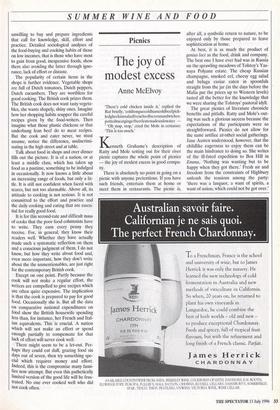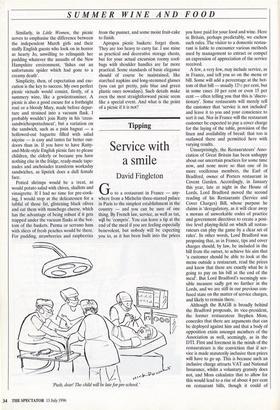Picnics
The joy of modest excess
Anne McElvoy
'There's cold chicken inside it,' replied the Rat briefly, 'coldtonguecoldhamcoldbeefpick- ledgherkinssaladfrenchrollscresssandwiches- pottedmeatgingerbeerlemonadesodawater ŌĆö "Oh stop, stop,' cried the Mole in ecstasies: 'This is too much.'
Knneth Grahame's description of Ratty and Mole setting out for their river picnic captures the whole point of picnics ŌĆö the joy of modest excess in good compa- ny.
There is absolutely no point in going on a picnic with anyone pretentious. If you have such friends, entertain them at home or meet them in restaurants. The picnic is, after all, a symbolic return to nature, to be enjoyed only by those prepared to leave sophistication at home.
At best, it is as much the product of genius loci as the food, drink and company. The best one I have ever had was in Russia on the sprawling meadows of Tolstoy's Yas- nays Polyana estate. The cheap Russian champagne, smoked eel, cheesy egg salad and beluga caviar eaten in spoonfuls straight from the jar (in the days before the Mafia put the prices up to Western levels) tasted all the better for the knowledge that we were sharing the Tolstoys' pastoral idyll.
The great picnics of literature chronicle benefits and pitfalls. Ratty and Mole's out- ing was such a glorious success because the expectations of the participants were so straightforward. Picnics do not allow for the same artifice as, ┬░the? social gatherings. Jane Austen understood, however, that the childlike eagerness to enjoy them can be the main hindrance to doing so. She writes of the ill-fated expedition to Box Hill in Emma, 'Nothing was wanting but to be happy when they got there.' Fresh air and freedom from the constraints of Highbury unleash the tensions among the party: 'there was a languor, a want of spirits, a want of union, which could not be got over.' Similarly, in Little Women, the picnic serves to emphasise the difference between the independent March girls and their stuffy English guests who look on in horror as hearty Jo, unwilling to relinquish her pudding whatever the assaults of the New Hampshire environment, 'fishes out an unfortunate spider which had gone to a creamy death'.
Simplicity, then, of expectation and exe- cution is the key to success. My own perfect picnic victuals would consist, firstly, of a summery wine, like a gewurztraminer. A picnic is also a good excuse for a forthright rose or a bloody Mary, made before depar- ture and strained into a vacuum flask. I probably wouldn't join Ratty in his 'cress sandwichespottedmeat', but a variation on the sandwich, such as a pain bagnat ŌĆö a hollowed-out baguette filled with salad nicoise ŌĆö is easy and tastes far better out- doors than in. If you have to have Ratty- and-Mole-style English picnic fare to please children, the elderly or because you have nothing else in the fridge, ready-made tape- nades and anchoiades transform workaday sandwiches, as lipstick does a dull female face.
Potted shrimps would be a treat, as would potato salad with chives, shallots and vinaigrette. If I had no time for pre-cook- ing, I would stop at the delicatessen for a tubful of those fat, glistening black olives and eat them with manchego cheese, which has the advantage of being robust if it gets trapped under the vacuum flasks at the bot- tom of the baskets. Parma or serrano ham with slices of fresh peaches would be there. For pudding, strawberries and raspberries from the punnet, and some moist fruit-cake to finish.
Apropos picnic baskets: forget them. They are too heavy to carry far. I use mine as practical and decorative storage chests, but for your actual excursion roomy cool- bags with shoulder handles are far more practical. Some standards of basic elegance should of course be maintained, like starched napkins and long-stemmed glasses (you can get pretty, pale blue and green plastic ones nowadays). Such details make even the most straightforward picnic seem like a special event. And what is the point of a picnic if it is not?



































































 Previous page
Previous page